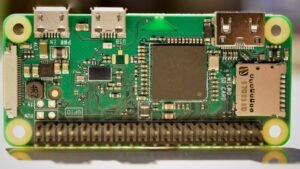Artificial Intelligence Quotes
Artificial Intelligence (AI) has become an integral part of our lives, with applications ranging from virtual assistants like Siri and Alexa to self-driving cars. As technology continues to advance, AI is evolving rapidly, paving the way for new possibilities. Here are some insightful quotes that shed light on the impact and potential of AI:
Key Takeaways
- Artificial Intelligence is transforming various industries and enhancing human capabilities.
- The potential of AI is vast, from healthcare advancements to automation in various sectors.
- AI can bring both opportunities and challenges, requiring careful consideration and responsible development.
“Artificial intelligence will reach human-level performance by 2029.” – Ray Kurzweil
Ray Kurzweil, renowned inventor and futurist, predicts that AI will match human intelligence by 2029. This statement emphasizes the rapid progress AI is making and the exciting possibilities that lie ahead.
“Whether we’re based on carbon or silicon makes no fundamental difference; we should each be treated with appropriate respect.” – Arthur C. Clarke
Arthur C. Clarke, a science fiction writer and futurist, highlights the need to acknowledge the potential of AI and treat it with respect, regardless of its form or composition.
| Advantages of AI |
|---|
| Automation of tedious and repetitive tasks. |
| Ability to process vast amounts of data quickly. |
| Enhancement of decision-making and problem-solving capabilities. |
“The question is not whether intelligent machines can have any emotions, but whether machines can be intelligent without any emotions!” – Marvin Minsky
Marvin Minsky, a pioneering AI researcher, raises an intriguing question about the role emotions could play in AI intelligence. It sparks curiosity about the potential relationship between emotions and machine learning.
AI in Healthcare
AI has tremendous potential to revolutionize healthcare, improving diagnostics, treatment, and patient care. Machine learning algorithms can analyze medical data with incredible precision, leading to faster and more accurate diagnoses.
| Applications of AI in Healthcare |
|---|
| Medical image analysis for detecting diseases like cancer. |
| Personalized medicine through genetic analysis. |
| Virtual nursing assistants to monitor patients. |
“AI is likely to be either the best or worst thing to happen to humanity.” – Stephen Hawking
Renowned physicist Stephen Hawking raises an important ethical concern about the potential consequences of AI. This quote reminds us of the critical responsibility humans have in guiding the development of AI technology.
As AI continues to advance, society must navigate the opportunities and challenges it presents. Striking a balance between innovation and ethics will be crucial in shaping the future of artificial intelligence.
AI in Automation
AI’s ability to automate tasks and streamline processes has made it invaluable in various industries. From manufacturing to customer service, AI-powered automation is transforming how businesses operate.
| Advancements in AI Automation |
|---|
| Robotic process automation (RPA) to improve efficiency. |
| Autonomous vehicles for transportation and logistics. |
| Natural language processing for chatbots and virtual assistants. |
“Artificial intelligence is the new electricity.” – Andrew Ng
Andrew Ng, a leading AI researcher, draws a parallel between the impact of AI and the revolutionary nature of electricity. This comparison highlights the transformative potential of AI in powering numerous aspects of modern society.
As we witness the growth of AI, it’s important to stay informed and engage in discussions about its societal implications. Only through responsible development and thoughtful decision-making can we truly harness the power of artificial intelligence.

Common Misconceptions
AI Can Replace Humans Completely
One common misconception surrounding artificial intelligence (AI) is that it has the potential to entirely replace human beings in various areas of life. While AI has undoubtedly made significant advancements in its capabilities, it is far from being able to completely replace human intelligence.
- AI is designed to augment human abilities and not replace them entirely.
- Human creativity, critical thinking, and emotional intelligence are still valued qualities that AI struggles to replicate.
- AI performs best when it is utilized in conjunction with human expertise and judgment.
AI Will Take Over All Jobs
Another common misconception is that AI will result in widespread job loss and unemployment. While it’s true that AI has the potential to automate certain routine tasks, it also creates new jobs and opportunities that require human skills and adaptability.
- AI will likely create more jobs than it displaces, as it opens up new avenues for growth and innovation.
- Jobs that require creativity, problem-solving, and empathy will be less susceptible to automation.
- AI technology can be used to enhance productivity in various industries, leading to higher job satisfaction and improved work conditions.
AI Will Lead to Superintelligent Machines
Many people believe that AI will inevitably lead to the creation of superintelligent machines that will surpass human intellectual capabilities and potentially become a threat. However, this notion is more speculative than grounded in reality.
- AI does not possess true consciousness or self-awareness, limiting its potential for exponential growth beyond the scope of its programming.
- The development of superintelligent machines is highly uncertain and would require significant advancements in technology that are yet to be achieved.
- Ethical considerations and regulations play a vital role in controlling the development and deployment of AI technologies, ensuring they align with human values and interests.
AI Is Only Useful in High-Tech Industries
Some people mistakenly believe that AI is only applicable and useful in high-tech industries such as robotics, healthcare, or finance. However, the influence and potential of AI extend well beyond these fields.
- AI can be applied in agriculture to optimize crop production and improve sustainability.
- In transportation, AI can enhance logistics and contribute to the development of autonomous vehicles.
- In education, AI can personalize learning experiences and provide adaptive tutoring.
AI Will Solve All of Humanity’s Problems
While AI holds great promise, it is not a panacea that can magically solve all of humanity’s problems. Expecting AI to solve complex societal issues without considering the broader context is unrealistic.
- AI is a tool and requires human guidance and ethical decision-making to ensure it benefits society as a whole.
- Social and economic factors still play a crucial role in achieving meaningful solutions, and AI is just one piece of the puzzle.
- AI may even introduce new challenges, such as ethical dilemmas and biases, that need to be carefully addressed.

AI Usage in Everyday Life
Artificial intelligence has become an integral part of our daily lives, impacting various industries and sectors. This table highlights some of the key areas where AI is utilized and the corresponding examples.
| Industry/ Sector | AI Application |
|---|---|
| E-commerce | Personalized product recommendations |
| Healthcare | Medical image analysis for diagnosis |
| Finance | Automated fraud detection |
| Transportation | Self-driving vehicles |
| Education | Intelligent tutoring systems |
The Rise of AI Startups
Startups focused on artificial intelligence solutions are increasingly capturing the attention of investors. The table below presents some astounding figures related to AI startup funding.
| Year | AI Startup Funding (in billions) |
|---|---|
| 2015 | 0.7 |
| 2016 | 1.2 |
| 2017 | 3.0 |
| 2018 | 9.3 |
| 2019 | 17.1 |
Machine Learning Algorithms
Machine learning is a fundamental aspect of AI. This table showcases some popular machine learning algorithms and their applications.
| Algorithm | Application |
|---|---|
| Linear Regression | Predicting stock prices |
| Random Forest | Sentiment analysis of social media data |
| Support Vector Machines | Image classification |
| Recurrent Neural Networks | Natural language processing |
AI Ethical Dilemmas
As AI advances, ethical concerns arise. The table below highlights some pressing ethical dilemmas associated with artificial intelligence.
| Ethical Dilemma | Description |
|---|---|
| Privacy Invasion | Use of personal data without consent |
| Job Displacement | Automation replacing human workers |
| Algorithmic Bias | Discrimination based on biased training data |
| Autonomous Weapons | Moral implications of lethal autonomous robots |
AI and Global Economic Impact
Artificial intelligence has tremendous economic potential. This table presents the estimated global economic impact of AI in the coming years.
| Year | Estimated Economic Impact (in trillions) |
|---|---|
| 2021 | 2.9 |
| 2025 | 10.7 |
| 2030 | 15.7 |
AI in Film and Literature
Artificial intelligence has long captured the imagination of storytellers. This table showcases famous films and books centered around AI.
| Title | Year | Description |
|---|---|---|
| Blade Runner | 1982 | A dystopian future where replicants challenge humanity |
| The Matrix | 1999 | A virtual reality simulation controlling humanity |
| I, Robot | 2004 | Exploration of AI morality through a police robot |
AI and Climate Change
Artificial intelligence can contribute to combating climate change. The following table illustrates AI’s role in environmental sustainability.
| Application | Impact |
|---|---|
| Energy optimization | Reduced energy consumption and emissions |
| Smart grid management | Efficient use of renewable energy sources |
| Weather prediction | Improved accuracy in climate forecasting |
AI in Medical Research
Artificial intelligence is revolutionizing medical research. This table showcases some remarkable achievements in the healthcare sector.
| Research Area | AI Contribution |
|---|---|
| Drug discovery | Accelerated identification of potential medications |
| Disease diagnosis | Precision and early detection of diseases |
| Genomic analysis | Enhanced understanding of genetic information |
The Future of AI
The field of artificial intelligence is constantly evolving. This final table presents some futuristic AI concepts.
| AI Concept | Description |
|---|---|
| Artificial General Intelligence (AGI) | Machines with human-level intelligence and understanding |
| Emotional AI | AI that can recognize, analyze, and respond to human emotions |
| Quantum AI | AI utilizing quantum computing to solve complex problems |
Artificial intelligence has transformed how we live, work, and interact. From assisting in healthcare and finance to raising ethical concerns, AI’s impact is undeniable. As AI continues to advance, the economic potential, ethical dilemmas, and futuristic concepts become all the more intriguing. With each passing day, artificial intelligence propels us further into a world where the boundaries between human and machine blur.
Frequently Asked Questions
1. What is artificial intelligence?
Artificial intelligence (AI) refers to the development of computer systems that can perform tasks that typically require human intelligence, such as visual perception, speech recognition, decision-making, and language translation.
2. What are AI quotes?
AI quotes are statements made by individuals, including experts in the field of artificial intelligence, that provide insights, opinions, or perspectives on various aspects of AI, its potential benefits, risks, and implications.
3. How can quotes help in understanding AI?
Quotes can help in understanding AI by offering different viewpoints, experiences, and expertise related to this rapidly evolving field. They can provide thought-provoking ideas, inspire further research, and shed light on the potential impact of AI on society.
4. Are there any famous AI quotes?
Yes, there are several famous AI quotes. Some examples include:
- “The development of full artificial intelligence could spell the end of the human race.” – Stephen Hawking
- “Artificial intelligence would be the ultimate version of Google. The ultimate search engine that would understand everything on the web.” – Larry Page
- “Artificial intelligence is the future, not only for Russia, but for all humankind.” – Vladimir Putin
- “We are on the edge of change comparable to the rise of human life on Earth.” – Vernor Vinge
5. Where can I find more AI quotes?
You can find more AI quotes by searching online platforms, such as websites, blogs, and social media platforms that focus on AI and technology. Additionally, books and articles written by experts in the field often contain valuable AI quotes.
6. How can AI quotes be used?
AI quotes can be used in various ways, such as in research papers, presentations, speeches, articles, or social media posts to highlight different perspectives on AI, support arguments, or provide inspiration for further exploration of the topic.
7. Are AI quotes reliable?
The reliability of AI quotes depends on the credibility and expertise of the individuals who made them. It is important to verify the sources and consider the context in which the quotes were given to ensure accuracy and relevance.
8. Can AI quotes predict the future?
No, AI quotes cannot predict the future as they are subjective opinions or perspectives of individuals. However, they can offer insights into current trends, challenges, and potential directions that AI research and development might take.
9. How can I cite AI quotes?
When including AI quotes in your work, it is essential to provide proper attribution to the person who made the quote. Include the speaker’s name, their affiliation or expertise, and the source (e.g., book, interview, conference) from which the quote was obtained.
10. Can I share AI quotes on social media?
Yes, you can share AI quotes on social media platforms, provided that you properly attribute the quote to the original source. Sharing quotes can generate discussions, raise awareness, and inspire others to explore the exciting world of artificial intelligence.




